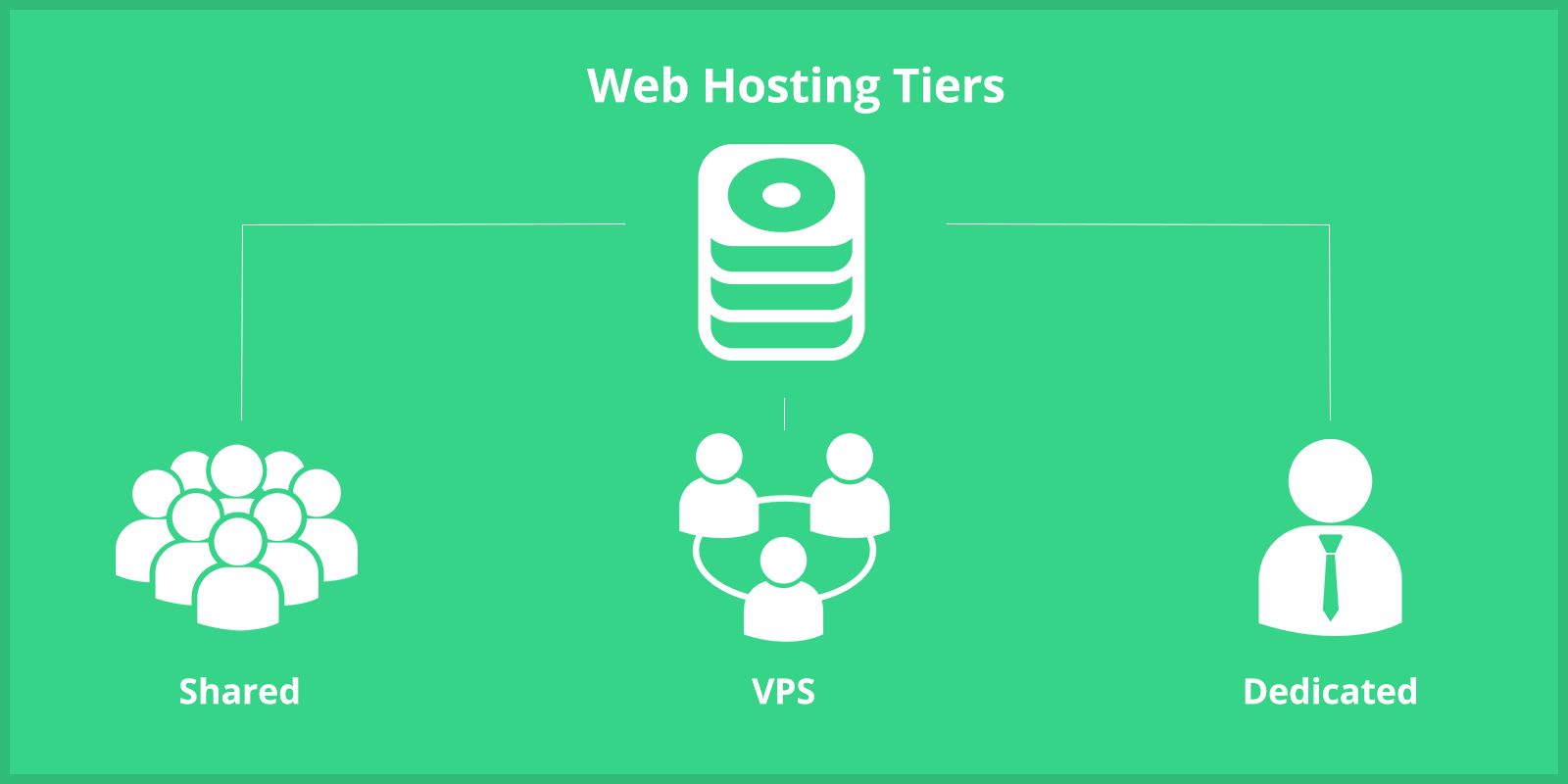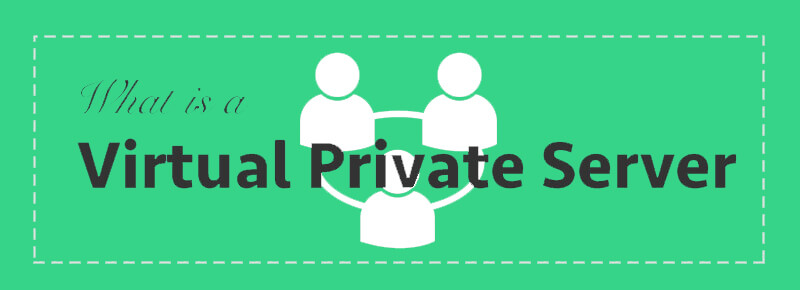If you’ve decided to choose a self-hosted publishing platform, you’ll need to host it somewhere. Hosting is how your web browser can load the pages you look at every day. All the layouts, colors, and data are stored on the web host’s server – now known as the cloud.
There are three fundamental types of hosting: Shared Hosting, Virtual Private Server (VPS), and Dedicated Hosting. Each have distinct advantages and disadvantages depending on what your needs are as a website. Let’s take a look at each of them more closely.

What is Shared Hosting?
Imagine that a server is a bookcase. The bookcase has a limited amount of shelf space and only so many people can take books out at the same time. If too many people try to take the books out, a line forms and it takes a while to get your book. But, since you’re sharing the bookcase with so many other people, it’s very affordable for all of you.
And so it is with a shared hosting server. If you purchase a shared hosting account, you’re websites will live on a server with many other small website from other customers. Since the websites are so small, they only use a fraction of the server resources so many sites can share the server. This is a very cost efficient strategy for the client and the hosting provider.
The Pros of Shared Hosting
Essentially, shared hosting is the best choice for small websites with low web budgets. It’s the cheapest solution and the easiest to manage.
1. Shared Hosting is the Most Affordable Option
Since the average customer of a shared hosting plan will only have one or two small websites, the hosting company can fit many people onto one server. This makes it extremely easy for the hosting company to pay for the server and still keep the cost low for the customer. The more people they can fit onto one server, the cheaper it can be.
2. Shared Hosting is the Easiest to Manage
Web Servers need special maintenance in order to run effectively. With technical upgrades and security issues, managing a private server can be a big task. Luckily, the shared server is managed by the host so you don’t have to worry about upgrades or security. They’ll make sure everything is running smoothly so you can focus on your website.
The Cons of Shared Hosting
Shared hosting isn’t the best solution if you have a lot of visitors or need to be very in-control of what goes on in your server. You’ll be at the mercy of the other customers of your server and may pay for their mistakes.
1. Shared Hosting Can be Very Slow
With so many different websites running from the same server, the load time for your website may suffer – especially if a few sites gain massive traffic. As more people visit the websites on your server, the server becomes strained and cannot send the information as quickly. This may force your site to have over 10 second load times and drive visitors away.
2. Other Shared Hosting Customers Can Break the Server
It happens. One bad script that tries to use all of the server resources can shut the server down causing all the sites to error. Your website could be broken for minutes or hours depending on how quickly the web host can resolve the issue. Naturally, this isn’t good for business and instantly drives traffic away and harms your reputation.
The Price of Shared Hosting
Shared hosting is the cheapest solution out there. That being said, every hosting company will have different packages and promotions for all different prices and features. You’ll find hosting from $1.99/mo to $30.00/mo depending on the company and the features they want to sell you. It’s important to do your research on each company and read reviews from people who have used it before. There are hundreds, if not thousands of hosting companies, so be diligent in finding the right one for you.
Interested in learning more? Read about Virtual Private Server Hosting below!
What is a Virtual Private Server (VPS)?
If we expand on the idea that a server is a bookcase, then a Virtual Private Server (VPS) is an exclusive bookcase. It only allows a few people to keep books on the shelves, everyone is guaranteed an entire shelf, and each shelf has its own line for visitors. It’s a bit more expensive than the shared bookcase, but offers more stability, security, and no one elses books can ruin your shelf.
A VPS is a server that has been split into X number of segments. Each client is given the same amount of speed, space, and bandwidth. You can think of it like premium shared hosting – fewer shared accounts with thicker partitions and assured resources.
The Pros of a Virtual Private Server (VPS)
A VPS is better suited for clients with larger sites that have significant traffic. It’s also preferred by websites that want a whole server to themselves, but can’t afford a dedicated server.
1. A VPS is Secure
In order to segment the system properly, the host installs a layer of software that dedicates part of the server to you. This partition means that everything that makes the server run (besides electricity) is completely separated from the other customers. Not only will they not be able to crash your websites, they can’t accidentally install malicious code on your server either!
2. A VPS is Fast
Since the VPS partitions the server internally, you don’t share any resources with the other users. This means that your website speed will be completely unaffected by what the other customers are doing on their side of the server. Never again will your site be slowed down by another hosting customer – truly a great feeling.
3. A VPS Allows Root Access
Sometimes, you may need to get your hands dirty with the configuration of the server. For those of you who may be technically savvy or who prefer to handle problems with the help of Google, having root access to make changes to your server will be tremendously helpful if you don’t want to wait for the support team to help you.
The Cons of a Virtual Private Server (VPS)
A VPS may break the budget for many smaller sites, especially if they’re not generating revenue. On top of that, your hosting provider may bet on the idea that you won’t use all your resources and over-book the VPS, which may cause conflicts if you want to use all your resources suddenly. Make sure to look at reviews for all hosting companies.
1. A VPS is More Expensive Than Shared Hosting
Since the host agrees to only partition the server few times, the price per partition must rise past that of shared hosting because they can no longer put as many customers as possible onto one server. On top of that, if you are not familiar with configuring a server most hosting providers will offer managed VPS’s which will cost more, but offer support and setup for your server. It all depends on what you need.
2. A VPS May Be Improperly Partitioned by the Host
Some websites owners may bite off more than they can chew with a VPS and only use a fraction of the allotted space. In theory, this shouldn’t matter, but depending on the host they may over-book the server with the notion that most of the clients will not use the full resources they’ve been given. The problem occurs when one or two partitions suddenly have a spike in resource use causing the same speed issues with shared hosting. Make sure to look at reviews for your host before sealing the deal.
3. An Unmanaged VPS May Be Difficult to Configure
Unmanaged servers require technical skills to set up and a VPS is no different. If you’ve never managed a server before, jumping in may not be the best way to kickstart your website. You could be stuck on configuration issues for days instead of passing the issue off to the server admin of a managed VPS. Most of the time it’s better to avoid the issue altogether and stick to managed hosting – especially non-technical users.
The Price of a Virtual Private Server (VPS)
Though it may be more expensive than shared hosting, a VPS has a vast range of pricing depending on the provider. Pricing may also increase if you need a managed, high capacity, top-speed server.
- Managed or Unmanaged
Do you need help configuring the server, installing programs, creating databases, etc? - Storage Space
Do you need a lot of file space for content and images? - Data Bandwidth
Will you have a lot of visitors downloading large web pages and files? - Computing Speed
Will your website crunch numbers, save data, or otherwise work behind the scenes for your visitors?
With packages from $4.00/month to $1500/month, it all comes down to what resources you really need from the server – especially if you want their team to manage it or not.
Still interested in learning more? Read about Dedicated Server Hosting below!
What is Dedicated Hosting?
Dedicated hosting is the biggest package of them all – it’s the entire bookcase for one customer. You get 100% of the storage and processing power of the server, but at a significant cost. Usually reserved for massive websites with tons of data, this option is not for the average website owner.
The Pros of Dedicated Hosting
Dedicated hosting is the most secure, resource abundant, and supported option available. Your server is not at the whim of other shared hosting customers, so your websites will load quickly with the lowest risk of malware infection.
1. Most Secure Option
You and you alone have access to your server. This means that you’re the only one responsible for malicious code instead of being at risk from the other customers on your server. You can also engage extra layers of protection to only allow access to the server from your IP address, massively scaling security.
2. Access to 100% of Server Resources
With dedicated hosting, your websites will never go down due to another customer suddenly using huge amounts of server resources. You completely own all of the server storage, bandwidth, and processing power so you’ll never be at the whim of another person’s website success.
3. Priority 24/7 Support
Since you’re paying a heavy premium, hosting companies will bend over backwards to give you their best support. Usually this includes phone, chat, email, and support tickets as well as access to premium forums and documentation.
The Cons of Dedicated Hosting
Though dedicated hosting provides the best speeds, storage, and security it comes at a hefty price. On top of that, managing your own server could require heavier technical experience. It’s likely not the best solution for startups and small businesses with a single low traffic website.
1. Most Expensive Option
It’s no secret. Dedicated hosting costs a lot more than shared hosting and VPS. You’re not sharing a server, so you don’t get the benefit of sharing the cost to run it either. With upgrades ranging from server size and speed to management and root access, the price can vary dramatically.
2. Technical Expertise Required
If you don’t plan on upgrading to a managed server, you’ll need extensive technical know-how in order to configure and manage the server on your own. You’ll also need to handle maintenance and if it crashes, which it rarely does, it can be very difficult to fix (even with the help of tech support).
The Price of Dedicated Hosting
Pricing of dedicated hosting varies substantially based on the server hardware and the management team. You can pay for an older server for a lot cheaper than the state-of-the-art alternatives, but the speed and reliability will be subject to age like any older computer. Dedicated servers can range from $49/month to $3000/month, though on average expect $300-$500.
Conclusion
If you’re a small business owner or a blogger with little to no web traffic, you should consider shared hosting for your website. You don’t need the resources or size of a VPS or dedicated server, not to mention their cost. However, if you have significant web traffic and find that your shared hosting account is slowing all of your websites down, it’s probably time to upgrade to a VPS. If you are building a massive technology business that needs top level security for your web data, then the dedicated server is for you.
If you have any questions about hosting, feel free to leave a comment below or contact us!











2 Responses
thank you for your wonderful article.it helped me to understand different type of web hosting as well as the data’s on my text book.
Do you have any suggestions for managed VPS for WordPress?